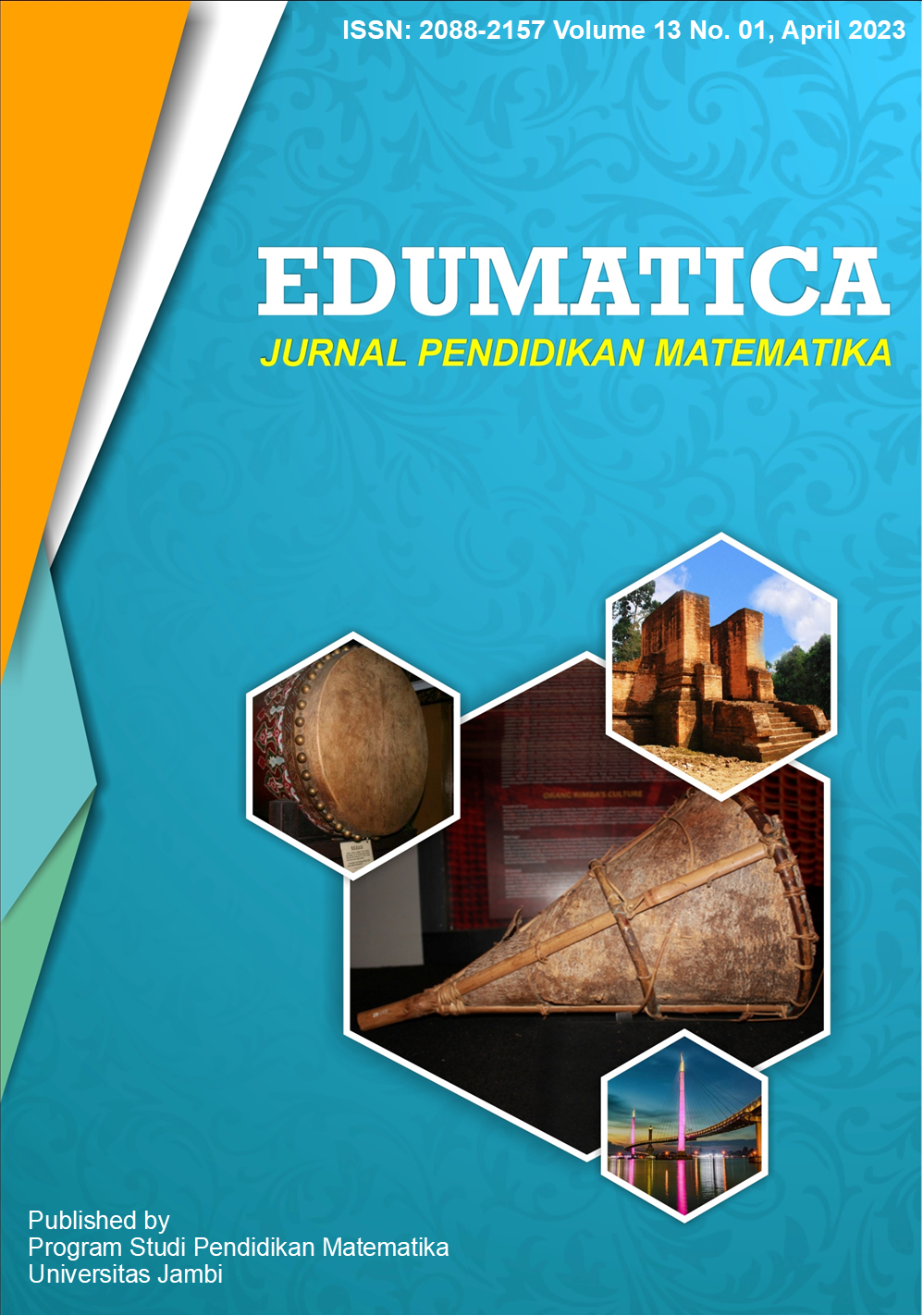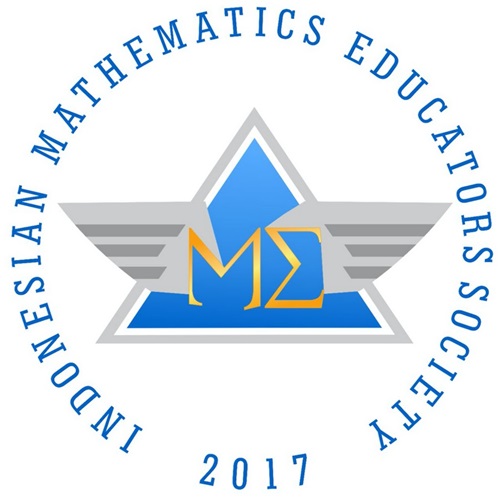The Effect of Problem Based Learning Models Using Contextual Worksheets on Middle School Students' Mathematical Problem Solving Ability
DOI:
https://doi.org/10.22437/edumatica.v13i01.24387Keywords:
problem based learning, problem solving ability, quasi experimentAbstract
Students need to have mathematical problem solving abilities to be able to solve complex mathematical problems. Mathematical problem solving abilities consist of understanding, planning, solving, and reviewing. These abilities can be trained through the application of appropriate learning models. One model that can be used is the problem based learning model. This study aims to determine the effect of the problem based learning model using contextual student worksheet on the mathematical problem solving ability of the junior high school students. This type of research is a quasi-experimental research with a research design of One Group Pretest-Posttest Design. The population in this study were all seventh grade students of SMP Negeri 12 Lebong in the 2021/2022 academic year. The sample in this study were class VIIA students, totaling 23 students as an experimental class taken by purposive sampling technique. The instrument used in this study was a problem-solving ability test sheet in the form of description questions. Data analysis using descriptive and inferential statistics. The results showed that there were differences in students' math solving abilities before and after learning. Based on the research results, it can be concluded that there is a significant influence on the Problem Based Learning model on mathematical problem solving in class VII students of SMP Negeri 12 Lebong.
Downloads
References
Anggraeni, R., & Kadarisma, G. (2020). Analisis Kemampuan Pemecahan Masalah Matematik Siswa SMP Kelas VII pada Materi Himpunan. Jurnal Cendekia: Jurnal Pendidikan Matematika, 4(2), 1072–1082. https://doi.org/https://doi.org/10.31004/cendekia.v4i2.334
Cahyono, T. (2015). Statistik Uji Normalitas. Yayasan Sanitarian Banyumas (Yasamas).
Isnawati, & Rosyana, T. (2021). Analisis Kesalahan Siswa dalam Menyelesaikan Soal Aritmatika Sosial. Jurnal Pendidikan Matematika, 4(3), 675–682. https://doi.org/10.22460/jpmi.v4i3.675-682
Jailani, Sugiman, Retnawati, H., Bukhori, Apino, E., Djidu, H., & Arifin, Z. (2018). Desain Pembelajaran Matematika Untuk Melatih Higher Order Thinking Skills (H. Retnawati, Ed.). UNY PRESS.
Lestari, K. E., & Yudhanegara, M. R. (2015). Penelitian Pendidikan Matematika. PT Refika Aditama.
Malini, R., Hanifah, & Agustinsa, R. (2020). Pengaruh Strategi REACT Terhadap Kemampuan Pemahaman Konsep Matematis Peserta Didik Kelas VIII SMP. Jurnal Penelitian Pembelajaran Matematika Sekolah (JP2MS), 4(3), 363–373. https://doi.org/https://doi.org/10.33369/jp2ms.4.3.363-373
Monica, H., Kesumawati, N., & Septiati, E. (2019). Pengaruh Model Problem Based Learning Terhadap Kemampuan Pemecahan Masalah Matematis dan Keyakinan Matematis Siswa. MaPan : Jurnal Matematika Dan Pembelajaran, 7(1), 155–166. https://doi.org/10.25139/smj.v8i1.2537
Ngalimun. (2014). Strategi dan Model Pembelajaran. Aswaja Pressindo.
Rusman. (2016). Model-Model Pembelajaran : Mengembangkan Profesionalisme Guru. PT RajaGrafindo Persada.
Sagita, I., Medriari, R., & Purwanto, A. (2018). Penerapan Creative Problem Solving Model untuk Meningkatkan Kemampuan Pemecahan Masalah Fisika Siswa Kelas XI MIA 4 MAN 2 Kota Bengkulu. Jurnal Kumparan Fisika, 1(3), 2–6. https://doi.org/https://doi.org/10.33369/jkf.1.3.1-6
Saragih, E. M., Astuti, D., Silaen, N. E., Ray, S. A., & Sartika, M. (2022). Pengaruh Model Problem Based Learning (Pbl) Berbantuan Lkpd Terhadap Kemampuan Pemecahan Masalah Matematis Siswa Kelas Vii Smp N 1 Kisaran. Prosiding Seminar Nasional Multidisiplin Ilmu Universitas Asahan Ke-5, 141–149.
Sari, A. M., Susanti, N., & Rahayu, C. (2018). Analisis Kesalahan Siswa Dalam Menyelesaikan Soal Cerita Pada Materi Aritmatika Sosial. JP3M Jurnal Penelitian Pendidikan Dan Pengajaran Matematika, 4(2), 61–68. https://doi.org/10.33369/jp2ms.4.3.455-463
Septiyani, D. Y., Yensy, N. A., & Maizora, S. (2017). Pengaruh Penerapan Pendekatan Pembelajaran Scientific Terhadap Hasil Belajar Matematika Siswa Di Kelas Viii. Jurnal Penelitian Pembelajaran Matematika Sekolah (JP2MS), 1(2), 127–136. https://doi.org/https://doi.org/10.33369/jp2ms.1.2.127-136
Simamora, R. E., Rotua Sidabutar, D., & Surya, E. (2017). Improving Learning Activity and Students’ Problem Solving Skill through Problem Based Learning (PBL) in Junior High School. International Journal of Sciences: Basic and Applied Research (IJSBAR) International Journal of Sciences: Basic and Applied Research, 33(2), 321–331. http://gssrr.org/index.php?journal=JournalOfBasicAndApplied
Sumartini, T. S. (2016). Peningkatan Kemampuan Pemecahan Masalah Matematis Siswa melalui Pembelajaran Berbasis Masalah. Jurnal Mosharafa, 5(2), 148–158. https://doi.org/10.31980/mosharafa.v5i2.270
Susanto, E., Rusdi, & Susanta, A. (2020). Peningkatan Kepercayaan Diri Mahasiswa Dalam Pembelajaranstatistika Dasar Melalui Problem Based-Learning Increase. Jurnal The Original of Mathematics, 4(2), 179–184.
Susanto, E., Susanta, A., & Rusdi. (2020). Efektivitas Project Based Learning Terhadap Kemampuan Pemecahan Masalah Dan Berpikir Kritis Mahasiswa. Jurnal THEOREMS (The Original Research of Mathematics), 5(1), 61–68.
Tanti, Rahim, U., & Samparadja, H. (2020). Pengaruh Model Problem Based Learning Terhadap Kemampuan Pemecahan Masalah Matematis Siswa Kelas VII Smp Negeri 14 Kendari. Jurnal Penelitian Pendidikan Matematika, 8(2), 169–182. https://doi.org/10.36709/jppm.v8i2.13659
Wahyuni, P., Astuti, D., & Ijuddin, R. (2018). Pengaruh Model Pembelajaran Berbasis Masalah Berbantuan Lkpd Terhadap Kemampuan Pemecahan Masalah Siswa Di SMA. Jurnal Pendidikan Dan Pembelajaran Khatulistiwa, 7(9), 1–9.
Yusri, A. Y. (2018). Pengaruh Model Pembelajaran Problem Based Learning Terhadap Kemampuan Pemecahan Masalah Matematika Siswa Kelas VII di SMP Negeri Pangkajene. Jurnal Musharafa, 7(1), 51–62. https://doi.org/10.31980/mosharafa.v7i1.341
Downloads
Published
How to Cite
Issue
Section
License
Copyright (c) 2023 Ringki Agustinsa, Vesi Anjasari, Nurul Astuty Yensy

This work is licensed under a Creative Commons Attribution-NonCommercial-ShareAlike 4.0 International License.







